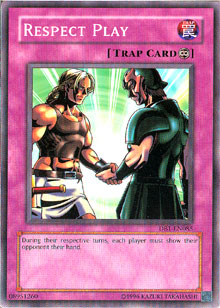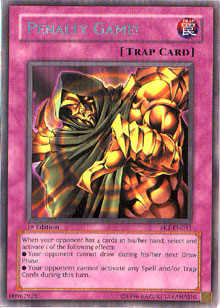 Players have made up the biggest population of just about every tournament — only rarely do we see an event where the judges and tournament staff outnumber the people actually playing! So players, take note — your behavior at the tournament has quite an impact, so remember that the success (or lack thereof) of the tournaments you participate does also rest with you.
Players have made up the biggest population of just about every tournament — only rarely do we see an event where the judges and tournament staff outnumber the people actually playing! So players, take note — your behavior at the tournament has quite an impact, so remember that the success (or lack thereof) of the tournaments you participate does also rest with you.
Now then, every person at an event has certain rights. This makes us happy — everyone loves having rights! Rights reassure us that the event will be fair, and that we are a significant part of what is going on. Everyone I meet at a tournament is big on having his or her rights.
However, with each of these rights come some responsibilities. You know, I’ve found that responsibilities are usually not quite as popular as rights — we do often hear "I have a right to (whatever it is)!" but I can’t say that "I have a responsibility to (whatever it is)!" resounds quite nearly as often.
Today, I want to put these rights and the responsibilities up against the wall so we can all get a good look at them, and see how important balancing them out actually is to the success of the tournament. Since this is the "player" article, we’ll focus on the players’ side of things.
Players’ Rights (Yeah!!) and Responsibilities (Do we hafta?)
Let’s start with civility, because I think that’s the foundation of just about everything.
Players have the right to be treated with civility.
Players, spectators, and judges should treat each other respectfully. Tournament staff or judges should not yell at or criticize the players, and players should not insult one another or behave crudely.
Players have the responsibility to treat others with civility.
Players have the right to respect, but they do not have the right to be disrespectful. Not to other players, not to judges, not to tournament officials and not to the Upper Deck representatives or the security officers.
Players often travel great distances, invest a lot in their decks, and otherwise put themselves out in order to get to an event. Judges volunteer their time and expertise to provide rulings and order to the tournament. The tournament organizer and his or her staff invest time and money to run the tournament. Everyone at the event has something to contribute, and all deserve to be treated politely and respectfully. One person passing along a bad attitude can poison an entire event — no one, not a player, a judge, or tournament staffer is ever mistake-proof, and no one has the right to belittle or insult anybody else.
Players have the right to unbiased rulings.
No judge alive (no player either, for that matter) knows every ruling, and many judges receive their training on the job, so it’s unreasonable to expect every judge to know every ruling. However, players do have the right to receive rulings that are unbiased and correct to the best of the judge’s knowledge. Judges should listen to both sides of a ruling dispute and ensure that they correctly understand the facts before issuing a ruling.

Players have the right to unbiased and consistent penalties.
Players have the right to appeal a ruling or penalty.
Provided the tournament is being run with a Head Judge and floor judge(s), players have the right to appeal a ruling issued by a floor judge. Whether it is a ruling or a penalty, players have the right to appeal once they have presented the issue to the floor judge and listened to his or her decision.
Players have the responsibility to prepare themselves beforehand with rulings and policy knowledge.
Know the rulings for the cards you’ll be playing. If you have a question about how cards interact, do some research before you get to the event! Players have the same access to official rulings as all but the highest level judges, and they should utilize them. If you decide to pass on your responsibility to know what your cards do by asking the judge when you get to the tournament, you will have to accept the rulings you’re given.
Know the policies and penalties. Most penalties a player receives at a tournament are given with the assumption that the infraction is unintentional — which means saying "But I didn’t know that" isn’t going to get you out of a penalty. Read the policy and penalty guidelines so you know what is expected of you at an event. And since players have the right to consistently enforced penalties, they have the responsibility to accept that when they commit an infraction (knowingly or not) the correct penalty must be given.
Make sure you are playing a legal deck, with the correct number of cards in the main deck (at least 40 and no more than 60) side deck (0 or 15 cards) and Extra deck (up to 15, including both Fusions and Synchros). The cards you include should all be legal according to the format list.
Players have the responsibility to accurately register and maintain their decks.
Fill out your decklist carefully before you hand it in, and make sure that what you’ve written on the list is exactly what is in your deck. Count your deck between games, to make sure you have all your cards. Check to make sure you don’t have any of your opponent’s cards. Examine your cards and sleeves between matches to ensure they are in playable and unmarked condition.
Most penalties can be prevented if players take this responsibility seriously.
Players have the right to make a statement if they are part of an investigation.
If you are investigated for an infraction that may (or does) result in a disqualification, you have the right to make a written statement to be submitted to Upper Deck, that tells your side of the story. No matter how upset you may be, you should avail yourself of this right as it provides your voice when the case is reviewed by the Penalty Committee.
There you are — a rundown of the basic rights and responsibilities of the player. Now, the main thing I want to leave you with is this — everyone has rights. You, as a player, have rights. So does every other participant at the event, including the judges and the tournament staff. Your rights are also linked to your responsibilities — if you do not abide by your responsibilities, you cannot fully claim your rights. When participants balance their rights with their responsibilities, the tournament experience improves, and improving Organized Play is what my columns are all about.